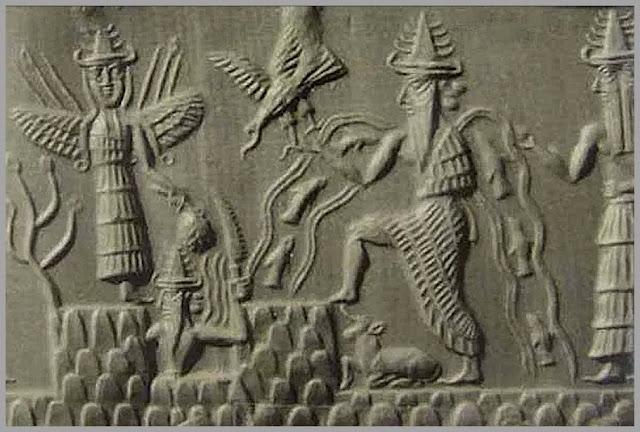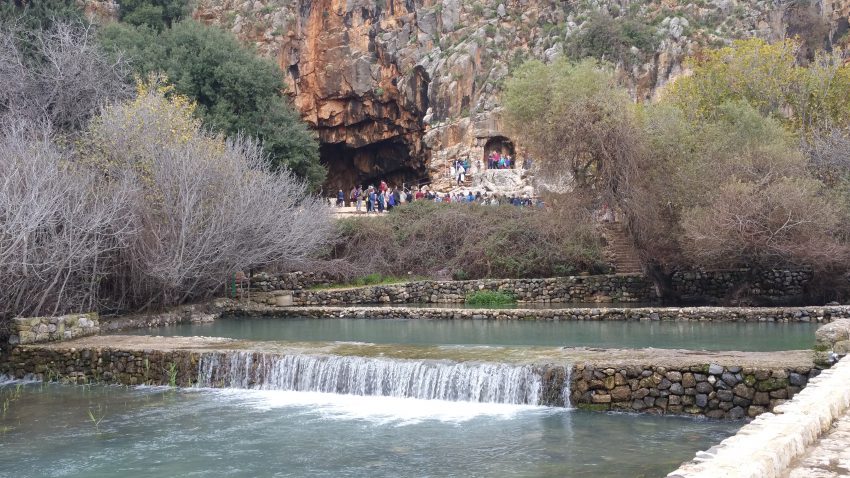
This is the first of the Genesis Timeline and Genealogies series. Read the second here.
How many of you, when you read Genesis 5, are just itching to draw a timeline? I love Bible genealogies, and so when I read the numbers in Genesis 5, the data are calling out to me to analyze them. The antediluvian timeline really is fascinating, and there are a lot of lessons to be gleaned from it.
The Patriarchs’ Lives
When I was younger, I’d read the chapter and because of the way it’s written, I got the impression that these people lived back-to-back, i.e., one dies before the another starts his life. For example:
“And Adam lived an hundred and thirty years, and begat a son in his own likeness, and after his image; and called his name Seth: And the days of Adam after he had begotten Seth were eight hundred years: and he begat sons and daughters: And all the days that Adam lived were nine hundred and thirty years: and he died. And Seth lived an hundred and five years, and begat Enos: And Seth lived after he begat Enos eight hundred and seven years, and begat sons and daughters: And all the days of Seth were nine hundred and twelve years: and he died. And Enos lived ninety years, and begat Cainan.” Gen 5:3-9
Because it would describe a complete life of a person first before going to the next, the overlap is not as highlighted. But in fact, the overlap is quite remarkable, because the reality is that Adam didn’t die in verse 5; he was still alive when Lamech was born in verse 25! These overlaps paint a different picture of life back then, and here’s my version of the antediluvian timeline.
Antediluvian Timeline from Adam to Noah
This means that Genesis 5 can also be written in the following way:
Adam lived 130 years and begat Seth.
When Adam was 235, Seth begat Enos.
When Adam was 325, Enos begat Cainan.
When Adam was 395, Cainan begat Mahalaleel.
When Adam was 460, Mahalaleel begat Jared.
When Adam was 622, Jared begat Enoch.
When Adam was 687, Enoch begat Methuselah.
When Adam was 874, Methuselah begat Lamech.
When Lamech was 56, Adam died.
All the days that Adam lived were 930 years.
That’s 9 generations living at one point for 56 years!!
Here are some points of observations from the timeline:
- Of the 10 antediluvian patriarchs, Methuselah lived the longest. He died the same year as the Flood.
- Methuselah was also the first patriarch to see a son died. All the other patriarchs died before their sons.
- Methuselah’s son, Lamech, died 5 years before the Flood(i.e., he did not die because of the Flood. God showed kindness to him and laid him to rest).
- Lamech was the most short-lived patriarch out of the 10. He died at 777. Interesting number.
- Lamech was also the only patriarch to be recorded to prophesy in Genesis 5 when he named his son, Noah. “And he called his name Noah [which means rest or comfort], saying, This same shall comfort us concerning our work and toil of our hands, because of the ground which the Lord hath cursed.” Gen 5:29. It sounds like he was weary of some toil – perhaps preaching to the people around him about righteousness and God.
- All 10 patriarchs saw the deprivation of mankind in their lifetime.
- Methuselah saw all the patriarchs from Adam (except Enoch and Noah) died.
- Enoch was taken up to heaven at year count 987.
- Seth was still alive when Enoch was taken up to heaven – he was 857 years old.
- This means that everyone from Seth to Lamech was around when Enoch was taken up to heaven.
- This also means that only Adam had died when this happened, meaning that everyone only saw one death, and the next big thing was Enoch’s translation. What encouragement! Adam had to leave Eden, but just 57 years after he died, someone in the 7th generation made it back to heaven. It’s a message of hope to humanity.
- Noah was born 14 years after Enoch’s translation.
- The chapter before records the genealogy of Cain. It does not, however, contain markings of time (i.e., no age, no date of birth). The way that we can tell time is through the lineage of the righteous.
If you have any additional observations, feel free to comment!
P.S. If you want the Excel file I used to create the image, let me know and I can email it to you.
spacer
This next article will help give you an understanding of the precepts of paganism and how they all were introduced.
Lucifer’s plan was to create varying kinds of paganism. Believers who refused to convert would be offered a form of paganism rising up from within the true religion. Paganism absorbed the majority of believers when they were lulled into a false religion that looked very much like the real thing they were used to. Next, a destructive war annihilated most of the few who still held to the truth. Finally, through a root of bitterness, the rest became just like the Cainites.
In chapter two we learned that Lucifer’s lie was that the creator God was fading away and people and angels would become gods in His place. This lie became the basis for the pre-flood false religion and all the pagan religions after the Flood.
In the Beginning
In the book of Genesis we learn that God created the heavens and earth (and everything in them) in seven days. As revealed throughout the Bible, God is a personal, intelligent, loving Being that wishes to have a personal relationship with each human being.
When Adam fell, he took on a sin nature. All his children inherited this sin nature. Eventually all humanity, except Noah and his family, degenerated into apostasy. They rejected the knowledge and worship of the one true God, turning to idols and what would later be called paganism.
The following quotes from the Bible, early church fathers, and the ancient history books of the Jews, give us a glimpse of what pre-flood paganism actually was. From these we can put together thirteen points that paint a clear picture of what the great lie consisted of and how it destroyed the ancient world.
The apostle Paul wrote that the pre-flood world knew God’s truth. They understood that God was completely separate from His creation. They also knew His power and Godhead were eternal, that there would never be any other gods. All of nature showed them that Lucifer’s Doctrine of Emanations was a lie. They deliberately rejected the true knowledge of God and willingly accepted Lucifer’s lie. They began to believe that their ancestors were evolving into gods and they began making idols.
“For the invisible things of him from the creation of the world are clearly seen, being understood by the things that are made, even his eternal power and Godhead; so that they are without excuse: Because that, when they knew God, they glorified him not as God, neither were thankful; but became vain in their imaginations, and their foolish heart was darkened. Professing themselves to be wise, they became fools, And changed the glory of the uncorruptible God into an image made like to corruptible man, and to birds, and fourfooted beasts, and creeping things.”
Romans 1:20-23 KJV1. Individual Idols
The first point is each person made his own individual idol for his own home. Having idols proves they were not atheists. We will see that each idol was different because each person was worshiping his own ancestor. If they worshiped their ancestors, they must have believed their ancestors, and eventually they too, would evolve into gods. See Teraphim in the chapter on Babylon.
“And the sons of men went and they served other gods, and they forgot the Lord who had created them in the earth: and in those days the sons of men made images of brass and iron, wood and stone, and they bowed down and served them. And every man made his god and they bowed down to them, and the sons of men forsook the Lord all the days of Enosh and his children;”
Jasher 2:4-5Eve
The Sumerians, thought by many Christians to be representatives of the pre-flood world, worshiped a goddess they referred to as Nin.ti. Nin.ti is usually translated the “Lady of Life,” but the literal translation is the “Lady of the Rib.” This is just one more example of pre-flood peoples worshiping their ancestors, including Adam and Eve. (and that was the beginning of Goddess Worship)
2. Evolve into a god
Satan tempted Eve by saying she could become just like God. In pre-flood paganism, Satan told people they could become gods themselves. First century magicians (Magi) thought after death they would become daemons, or helper spirits like elves or angels. But we learn through church father Tertullian, in the original pre-flood idolatry, people believed after death they were supposed to become a god.
“In this way, even by magic, which is indeed only a second idolatry, wherein they pretend that after death they become demons, just as they were supposed in the first and literal idolatry to become gods.”Tertullian Treatise on the soul 57
“God knows that your eyes will be opened when you eat it. You will become just like God, knowing everything, both good and evil.”
Genesis 3:5 NLT3. The original Creator God no longer exists
The third point of their pagan religion is that they taught the original Creator God no longer exists. (God is DEAD) The original creative force/god emptied itself into creation and no longer existed. We learned in chapter two, this was Lucifer’s original lie.
“And they called to Noah, saying, Open for us that we may come to thee in the ark – and wherefore shall we die? And Noah, with a loud voice, answered them from the ark, saying, Have you not all rebelled against the Lord, and said that he does not exist?”Jasher 6:18-19
Again, these people were idolaters, not atheists. They believed that the original God ceased to exist or at least was greatly diminished and would soon disappear for all eternity.
4. Salvation is not needed.
The fourth point is there was no need for salvation. Any kind of salvation would be done “by their own strength.” All will make it to godhood on their own, eventually. Magic just speeds up the process. This also included the idea that there is no hell.
“The LORD saw how great man’s wickedness on the earth had become, and that every inclination of the thoughts of his heart was only evil all the time.” Genesis 6:5 NIV
“They were despisers of all that was good, on account of the confidence they had in their own strength.” Josephus Ant. 1.3.1
5. Observed omens in the sun and moon and
6. Charted their movement through the Zodiac.The fifth and sixth points are that they used a form of astrology that centered on predicting omens, like eclipses, in the sun and moon and charted their courses through the zodiac. This was practiced as a means to summon the magic energies for rituals and to contact their ancestor gods at the appropriate times.
“And Cainan grew, and his father taught him writing, and he went to seek for himself a place where he might seize for himself a city. And he found a writing which former generations had carved on the rock, and he read what was thereon, and he transcribed it and sinned owing to it; for it contained the teaching of the Watchers in accordance with which they used to observe the omens of the sun and moon and stars in all the signs of heaven. And he wrote it down and said nothing regarding it; for he was afraid to speak to Noah about it lest he should be angry with him on account of it.” Jubilees 8:1-5
7. No horoscopes
The pre-flood astrology did not have the idea of a horoscope. The horoscope was invented after the Flood by the Chaldeans. In the pre-flood version astrology was only used to predict the next scheduled date for magic rites and the next time one could contact a god or goddess ancestor.
“The Horoscope was invented by the Chaldean astrologers.”Hippolytus Heresies 4.3
8. Invented by demons
The pre-flood magic system, including astrology, was the invention of demons.
“Demons invented the concept of fate with astrology to enslave man into worshiping them.”
Tatian to the Greeks 99. Ritual use of Blood
Blood sacrifices, magic, demonology and ritual drinking of blood was used by post-flood Canaanites. The ritual use of blood was also part of the pre-flood religion. All animal sacrifices involved blood, but they are always referred to as animal sacrifices. When a ritual called for a blood sacrifice instead of an animal sacrifice we know it means the use of blood. The blood is what was needed, not necessarily the sacrifice of a living animal.
“In the twelfth generation, when God had blessed men, and they had begun to multiply, they received a commandment that they should not taste blood, for on account of this also the deluge had been sent… In the fourteenth generation one of the cursed progeny (Canaanites) first erected an altar to demons, for the purpose of magical arts, and offered there blood sacrifices.”
Recognitions of Clement 1.30God knew this false religion would return after the Flood; so He commanded Noah to ensure his children would not consume blood when eating meat.
“Every moving thing that is alive shall be food for you; I give all to you, as I gave the green plant. Only you shall not eat flesh with its life, that is, its blood.” Genesis 9:3-4 NASB
10. Evolution / Reincarnation
All pagan religions teach reincarnation with evolution. A pagan religion can’t have one without the other. Likewise the religions of the Christians and Jews teach special creation along with resurrection. These two can’t be divorced, either. If we can prove evolution will be a part of the harlot church, we then know reincarnation will be, too. The book of Revelation shows the end time church becomes part of the Mystery Babylon religious system. Second Peter’s prophesy states that it begins by the church rejecting creation and Noah’s Flood, in favor of Evolution. This is taking place today in many denominations.
“There shall come in the last days scoffers, walking after their own lusts, And saying, Where is the promise of his coming? for since the fathers fell asleep, all things continue as they were from the beginning of the creation. For this they willingly are ignorant of, that by the word of God the heavens were of old, and the earth standing out of the water and in the water: Whereby the world that then was, being overflowed with water, perished.”
2 Peter 3:3-6“I saw a woman sitting on a scarlet beast… This title was written on her forehead: “Mystery Babylon the great, mother of prostitutes and of the abominations of the earth.”
Revelation 17:3,5 NIV11. Evolution without karma
The belief that each person was evolving into a higher life form was part of the pre-flood religion. Post-flood paganism added the doctrine of “transmigration of souls,” which means if your “karma” or life style is very bad, instead of evolving into a higher life form, one may “de-evolve” or come back as a lower form of life. The doctrine of “karma” was not part of the original paganism. This makes sense, because Lucifer wanted everyone to believe there is no hell and we are all okay, so you can only go forward. We will see this again in the post-flood histories.
“But I cannot here omit that which some erring philosophers say, that men and the other animals arose from the earth without any author.”
Lactantius Divine Institutes 2.11“Plato, that ancient Athenian, who also was the first to introduce this opinion (the doctrine of transmigration of souls).”
Irenaeus Against Heresies 2.3312. Ghosts, Demons, and Nature Spirits
Nature spirits were thought to be the life force in all of creation. This is connected to pantheism. If at death our spirits could evolve into a god, then the worship of demons and ghosts would be prominent. Notice their idols were not just demons and nature spirits, but also phantoms. “Phantom” is the Greek word for ghost.
“You who serve stones, and ye who make images of gold, and silver, and wood, and stones and clay, and serve phantoms, and demons, and spirits”
Tertullian Idolatry 1.413. Homosexual Marriage
There has always been homosexuality. It has always been classified as a sin before God. The Canaanites practiced homosexual rituals in the worship of their gods and goddesses, but since the time of Noah there has never been a nation that sanctioned homosexual marriage. But the rabbis state this did occur right before Noah’s Flood. This may have been a part of the pre-flood religion; or it just may have been a result of it.
In Romans 1, the apostle Paul seems to indicate that idolatry produced immorality; and together idolatry and immorality caused the Great Apostasy. That, in turn, resulted in extreme forms of homosexuality, which caused God to destroy the world.
“Professing themselves to be wise, they became fools, And changed the glory of the uncorruptible God into an image made like to corruptible man, and to birds, and fourfooted beasts, and creeping things. Wherefore God also gave them up to uncleanness through the lusts of their own hearts, to dishonour their own bodies between themselves: Who changed the truth of God into a lie, and worshipped and served the creature more than the Creator, who is blessed for ever. Amen. For this cause God gave them up unto vile affections: for even their women did change the natural use into that which is against nature: And likewise also the men, leaving the natural use of the woman, burned in their lust one toward another; men with men working that which is unseemly, and receiving in themselves that recompence of their error which was meet. And even as they did not like to retain God in their knowledge, God gave them over to a reprobate mind, to do those things which are not convenient.”Romans 1:22-28
The ancient rabbis seem to believe this also. They stated the practice of ordaining homosexual marriage was the last step in the downward spiral that caused God’s judgment.
“Rabbi Huna said in the name of Rabbi Joseph, ‘The generation of the Flood was not wiped out until they wrote marriage documents for the union of a man to a male or to an animal.’” Genesis Rabbah 26:4-5; Leviticus Rabbah 23:9
“Rabbi Hiyyah taught: The passage reads ‘I am the Lord, your God’ two times – I am the One Who punished the generation of the Flood, and the people of Sodom and Gomorrah, and Egypt; and in the future I will punish those who do as they did. The generations of the Flood were kings, and were wiped off the earth when they were soaked in sexual sin.”Leviticus Rabbah 23:9 (commentary on Leviticus 18:3)
“And what did they do? A man got married to a man, and a woman to a woman, a man married a woman and her daughter, and a woman was married to two (men). Therefore it is said, “And you shall not walk in their statutes”
Sifra Acharei Mot, Parashah 9:8 (Commentary on Leviticus 18:3)Church fathers Clement of Alexandria (ECF 2.77) and Tatian (ECF 2.143) tell us that the ancient Romans and barbarians considered homosexuality and pederasty crimes punishable by death. In the first century, however, homosexuality and pederasty were widely practiced by the Romans.
When all this came about and Noah and his family were the only ones left still faithful to God, God instructed Noah to build the Ark and the world was then destroyed by a flood of water.
“And God looked upon the earth, and, behold, it was corrupt; for all flesh had corrupted his way upon the earth. And God said unto Noah, The end of all flesh is come before me; for the earth is filled with violence through them; and, behold, I will destroy them with the earth.”Genesis 6:12-13
Conclusion
These points give the following picture for pre-flood paganism:
One can’t “de-evolve” (compared to Hinduism’s doctrine of karma). Contacting the nature spirits may also help in your evolution. The magic rites included blood rituals.
On the following page is a master chart compiling all the above data from the source material. In a later chapter we will examine the Canaanite occultic practices individually and add them to the master chart.
Pre-Flood paganism included:
1. A unique individual god/idol in each home
2. Evolution into a god or goddess after death
3. The original creator God ceased to exist
4. Salvation not needed
5. Observation of the sun and moon for omens
6. Astrology focusing on the sun, moon, and zodiac
7. Astrology without horoscopes8. Invented by demons
9. Ritual use of blood
10. Evolution/Reincarnation
11. Evolution without karma (no de-evolving)
12. Ghosts, demons, nature spirits
13. Homosexual marriageBy Ken Johnson in ” Ancient Paganism – The Sorcery of the Fallen Angels”, CreativeSpace, USA, 2009, excerpts chapter 3. Digitized, adapted and illustrated to be posted by Leopoldo Costa.
What is BioLogos? – Resources – BioLogos
spacer















